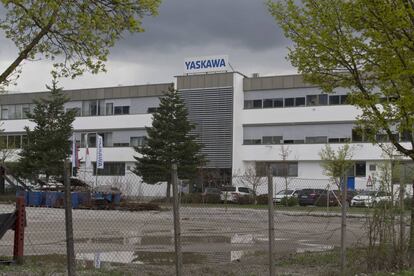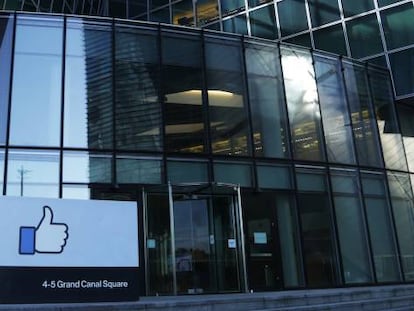The fight of the century: man versus machine
The inauguration of the first robot factory in Europe reignites the debate over the loss of jobs and the fascinating question of whether machines should have to pay taxes

Andrej has the odd ache and pain after working 40 years in a factory as a tin welder. At 60, he’s close to retirement and sees himself taking country walks in the morning and enjoying a beer with friends in the evening. But that doesn’t mean he isn’t worried about what will happen to those who will replace him. For they will be competing with a source of labor available 24/7, one that never complains, and one that, to top it all off, is about to be produced in his home town.
A market leader in robotics, the Japanese company Yaskawa is opening its first factory in Europe and has chosen the town of Kocevje, Slovenia, to host the venture. Previously working out of China and Japan alone, this marks the company’s strategic expansion into the EU. The automatons are about to arrive...
This imminent development reopens the age-old man-versus-machine debate that first raged during the industrial revolution. According to a report from the Organization for Economic Co-operation and Development (OCDE), more than 60 million workers are at risk of being replaced by robots in the coming years. The study goes on to point out that 14% of jobs in the developed world are easily automated. And more than 30% will certainly undergo significant changes. Manufacturing and agriculture are both on the front line of so-called “industrialization 4.0,” a term coined by economists in reference to the technological revolution.
More than 60 million workers are at risk of being replaced by robots in the coming years
The debate is of supreme interest to robotics professor Marko Munih, from Ljubljana University. Munih only sees the upside of the revolution that, according to the International Federation of Robotics (IFR), has grown by 15% a year since 2010.
In his view there will be benefits for the consumer, who will get things cheaper, but also for the worker who, with the right training, can undertake more qualified employment, that will be better paid and less repetitive.
In the short term at least, Munih doesn’t foresee automation taking over industry completely. Rather, he envisions robots collaborating with humans, one doing the heavy boring work and the other employed in tasks requiring more precision and imagination.
“Side by side, without fences or barriers,” he says. “The robot is the helper who will carry something heavy, like a wheel, for example, and the human will only have to adjust it. Or the robot will help the nurse to lift the patient, or it will help the surgeon as though it were an extension of his arm. Can you imagine? Well, it’s already happening, although not on a big scale.”
But will the robots put less-qualified workers’ jobs at risk? Munih does not share the vision of the OECD. The way he sees it, the past has demonstrated that technology simply brings humans new opportunities. And if Europe doesn’t embrace this revolution wholeheartedly, it could be the death of us. “We have to be aware that China is installing 70,000 robots a year, more than the whole of Europe combined. That means there’s massive competition,” he says.

Naturally, Munih is pleased that Yaskawa is establishing a base in Slovenia, which is already Eastern Europe’s most highly automated country due to a thriving car industry. Despite having little more than one million inhabitants, it ranks number 16 on the world index for the introduction of robots in manufacturing.
Manfred Stern, president of Yaskawa Europe, explains that the government’s support, its flexibility as well as the local pool of highly trained engineers, made the decision to opt for Slovenia easy, not to mention the fact Yaskawa already has a components factory here.
Andrej, the tin welder, is aware that progress brings benefits, but as a manual laborer, he also knows that many employees will not be sharing in them. His fears are borne out by Chinese company Foxconn, a supplier for Apple and Samsung, which replaced 60,000 workers with robots two years ago. And as he sits in a bar contemplating the possibility of job losses, he also broaches the subject of the state taxing the robots to compensate.
This idea has an unexpected champion in the figure of Bill Gates, whose vision is more that of a philanthropist than a businessman. In an interview with digital news outlet Quartz, the Microsoft founder explained that in the next few decades, many jobs would be automated and governments should be prepared for the fallout. “Certainly,” he said, “there will be taxes that relate to automation. Right now, the human worker who does, say, $50,000 worth of work in a factory, that income is taxed and you get income tax, social security tax, all those things. If a robot comes in to do the same thing, you’d think that we’d tax the robot at a similar level.” He then added that he doubted robot companies would be outraged by the introduction of such a tax.
The talk in Brussels
But the EU has been less than enthusiastic on the matter. Last year, the European Parliament refused to even discuss such a levy. Now the European Commission has gone so far as to contemplate a series of measures designed to put Artificial Intelligence at the service of European citizens.
These measures range from investing €20,000 until 2020 into AI R&D, overhauling the education system and recycling jobs to help those affected by job losses.
Basically, the aim is to guarantee an ethical framework to meet the changes that are upon us, including the protection of personal data and accidents. But, for now at least, taxing robots is not on the agenda.
The US and China are investing a great deal in Artificial Intelligence and we can’t afford to be left behind Adrus Asip, vice-president of the Single Digital Market
“No way,” says Adrus Asip, the vice-president and European commissioner for the Single Digital Market. “We have to encourage innovation, not suffocate it. International competition is fierce. The US and China are investing a great deal in Artificial Intelligence and we can’t afford to be left behind.”
Asip adds that progress is always complicated. But the priority is to ensure Europeans have the skills to make the most of the digital revolution.
According to an EU spokesman who met with the directors of Yaskawa, the company had been lured to Europe because of the market conditions and the next step is to supply that market with talented engineers who can develop their skills here as opposed to having to find work elsewhere.
He also mentioned the importance of not leaving small- and medium-sized businesses behind. At the end of the day, it’s about the EU not being caught unawares when the digital tsunami sweeps across its member states. “We have to be prepared,” he says flatly.
As Bill Gates predicted, Manfred Stern is not outraged by the suggestion of a robot tax but he is also far from supportive of it. “If you look at the countries with the greatest number of robots – South Korea, Germany, Japan – you can see they also have the least number of unemployed,” he says.
Munih agrees: “If you took this to its logical conclusion, you could end up taxing a company’s screwdrivers,” he jokes.
English version by Heather Galloway.


